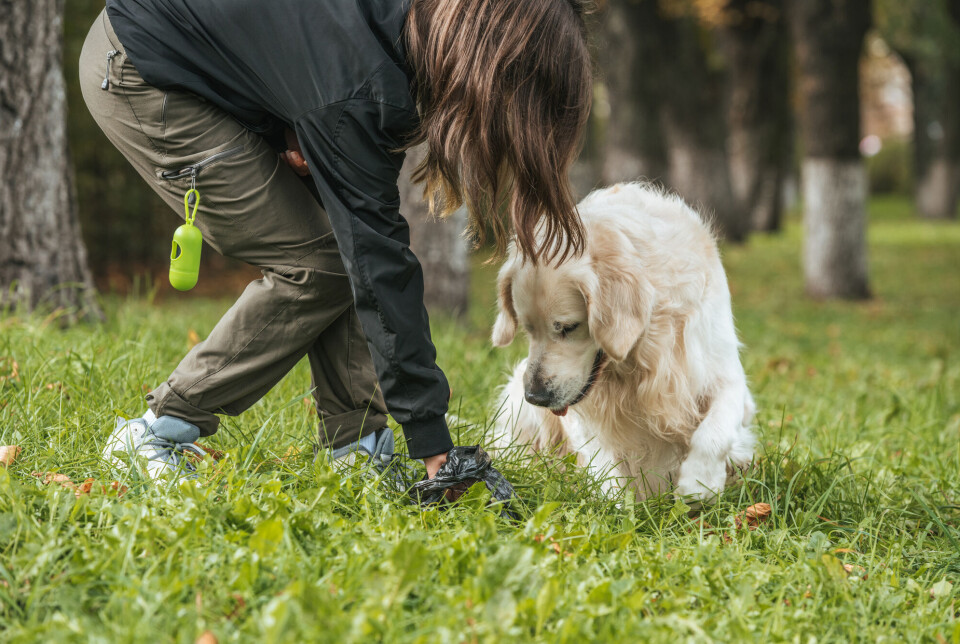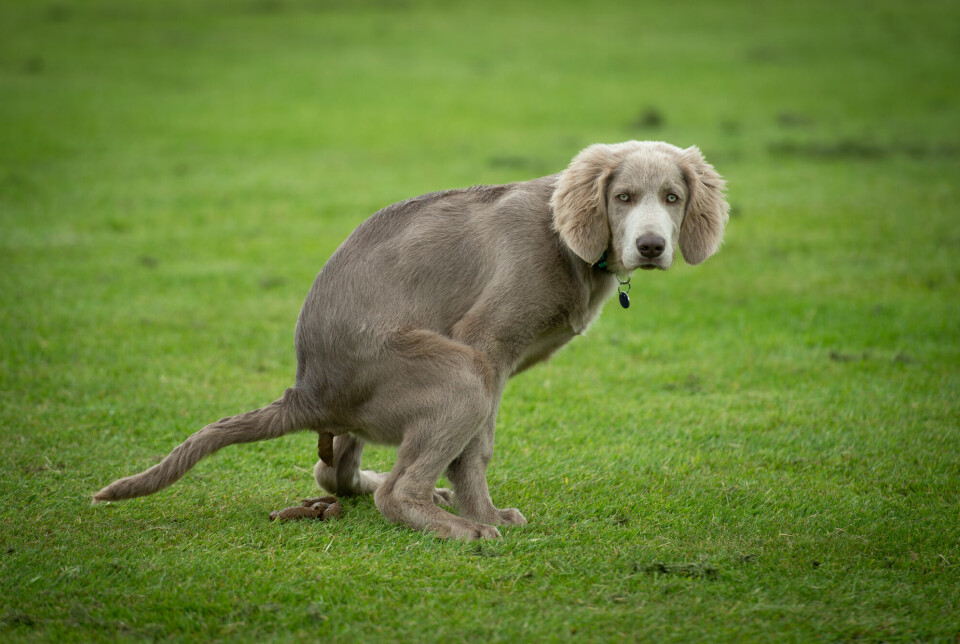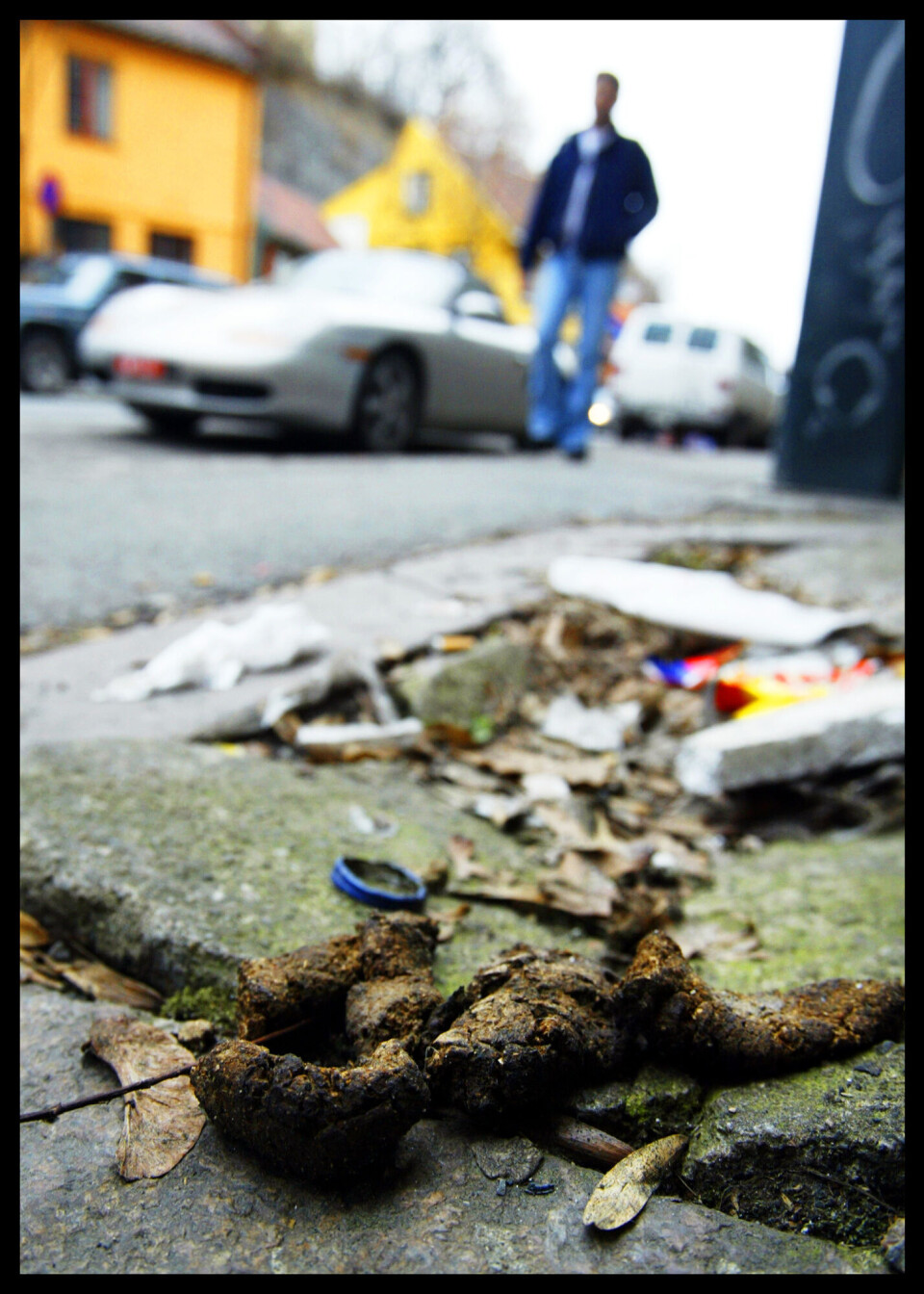
Do we really need to pick up dog poop?
Yes, according to scientists. But should we also do it while hiking in the woods?
Dog poop is disgusting, and it smells bad. No one wants poop under their shoes and into the house, whether it's dry, fresh, warm, or cold.
Most people do not find it acceptable to have piles of dog faeces in their garden, on the pavement, along riverside trails, or outside shops.
But dog poop is completely natural. Is it really a big deal if some foul-smelling piles are left lying around here and there?
Dogs can get stomach flu
Dog poop that is left behind poses a health risk for both animals and humans, according to research.
It may contain so-called disease-causing microorganisms.
“A dog with an infectious bowel disease can pass it on to another healthy dog that smells or licks the faeces,” Henning Sørum writes in an email to sciencenorway.no.
He is a professor of bacteriology and mycology at the Norwegian School of Veterinary Science.
Fresh faeces can, for example, give other dogs gastroenteritis.
Sørum explains that the microorganisms in the faeces can lead to disease in humans if the dog is a carrier of bacteria like salmonella, campylobacter, and E.coli, or the single-celled parasite Giardia and certain endoparasites.
Roundworms hatch in the human intestine
Another danger with dog poop is roundworms.
“There may be a risk that young dogs have roundworms that can deposit eggs in the faeces,” he writes.
These eggs can end up hatching in the human intestine, according to Sørum.
“This is essentially the same as what can happen when cats defecate in sandboxes where small children play and put sand in their mouths,” he says.
Can contaminate our water
According to a 2016 study, dog faeces may contain antibiotic-resistant bacteria.
This means that people who come into contact with dog faeces can develop bacterial infections that are very difficult to treat. This is stated by Melissa Starling, who is a researcher at the University of Sydney, Australia, in a post on Videnskab.dk (link in Danish).
She also talks about a study from Sydney that shows that dog faeces get washed away in rainwater and can therefore contribute to significant water pollution.
People make their own decisions
It is therefore not a very good to leave dog poop behind. But who is actually doing it?
British researchers have investigated it more closely and have mapped out what characterises those who take responsibility for the poop, and those who do not. In the UK, it is illegal to leave dog poop behind.
The study reveals that British dog owners often choose for themselves where and when to pick up after their dogs. They do not always adhere to the rules.
Dog owners make the decision based on whether they are outdoors in nature or in parks, how crowded it is, and whether the poop ends up on the path or off it.
The same study also states that some dog owners are ‘too proud to pick up’ the poop.
Researchers call them disengaged dog owners who do not want to clean up after themselves, even though they are aware of the health and environmental consequences.

Might as well leave it behind in forests
Henning Sørum thinks it might not be a big concern if dogs do their business in more remote areas.
“Out in the forests and fields, away from trails or roads where many people regularly walk their dogs, dogs should be able to defecate without their owners picking it up. At least in terms of the risk of infection for dogs or humans,” he writes.
“That means in wilderness areas without concentrated traffic of dogs or people.”
Sørum says that most dogs actually try to leave their faeces in secluded places.

“Perhaps because it is ingrained in their behavioural patterns that faeces should be hidden away,” he writes.
Also applies to pigs and horses
This also applies to other animals that live among us humans.
“Animals that are accused of being unclean, such as pigs, are initially very clear about leaving faeces in fixed locations far away from where they normally lie or stay,” he writes.
“Horses that live in stables with plenty of space also prefer to defecate in the same corner all the time.”
Dog owners are obliged to remove faeces
There is a specific act on responsible dog management in Norway (link in Norwegian).
However, it contains no provisions that make leaving dog faeces behind illegal or subject to punishment.
It generally states that the dog owner (the person who owns or takes care of a dog) should ensure that the dog is not an unreasonable inconvenience to people, the environment, or other interests.
Different municipalities, however, may have their own regulations on dog faeces. In Bergen municipality, for example, "dog owners are obliged to remove faeces that dogs leave on and along public roads or in other areas that are accessible to the public, in built-up areas, on public beaches, park-like areas outside built-up areas, and on and along hiking trails and prepared ski trails."
Nevertheless, it often happens that dog excrement is left behind.
Beyond dog bags, bins, and the enforcement of leash laws, research suggests that public education helps. This is written by Canadian and Italian researchers in a Nature study from earlier this year.
People are indeed responsive to social norms.
The researchers therefore suggest putting up signs telling dog owners to pick up after themselves. It may also be appropriate to issue a warning or two that the area is being monitored.
Translated by Alette Bjordal Gjellesvik
———
Read the Norwegian version of this article on forskning.no





































